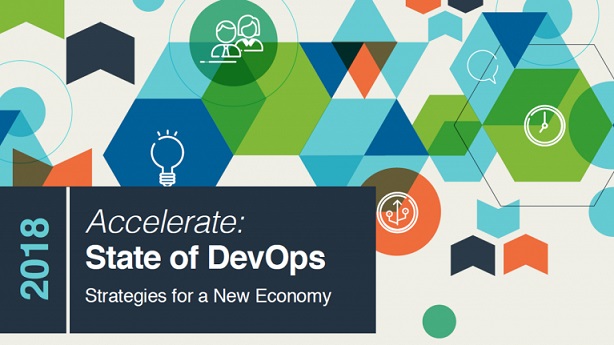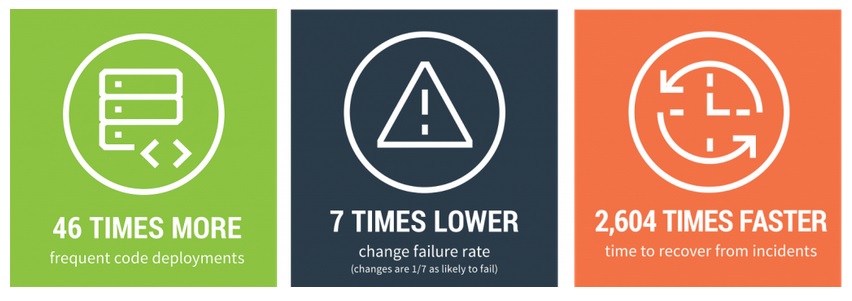Pegasystems introduced Pega Agentic Process Fabric™, a service that orchestrates all AI agents and systems across an open agentic network for more reliable and accurate automation.
You'll probably have heard of the Accelerate State of DevOps Report from DORA. Now in its fifth year and backed by rigorous research involving 30,000+ professionals worldwide, it has consistently shown that higher software delivery performance delivers powerful business outcomes.

There's a welcome insight in the 2018 report, however, because for the first time it calls out database development as a key technical practice which can drive high performance in DevOps. This matches similar findings in research from Redgate Software, which sponsored the report and provided input.
Database development has entered the picture because deploying changes to the database is often the bottleneck in software development and slows down releases. To address this, the report investigated which database-related practices help when implementing continuous delivery to improve software delivery performance and availability.
The results revealed that teams which do continuous delivery well use version control for database changes and manage them in the same way as changes to the application. It also showed that integrating database development into software delivery positively contributes to performance, and changes to the database no longer slow processes down or cause problems during deployments.
The highest performing organizations which adopt DevOps release changes 46X more frequently
The starting block is communication, cross-team collaboration and visibility, which echoes Redgate's own 2018 State of Database DevOps Survey earlier in the year. This showed that 76% of developers are now responsible for both application and database development, and 58% reported their development teams and DBAs work on projects together.
In terms of DevOps itself, the report shows that the highest performing organizations which adopt DevOps release changes 46 times more frequently, have a change failure rate that is 7 times lower, and are able to recover from breaking changes 2,604 times faster.

Crucially, the lead time from committing changes to being able to deploy them is less than one hour in the highest performing organizations – and between one and six months in low performers. Between 46% and 60% of changes deployed by low performers also require some form of hotfix, rollback, or patch.
Beyond those figures, there is one sentence in the report that stands out as the key differentiator and reason for adopting DevOps:
"Those that develop and deliver quickly are better able to experiment with ways to increase customer adoption and satisfaction, pivot when necessary, and keep up with compliance and regulatory demands."
This ties in with achieving regulatory compliance by adopting database DevOps. The automation it encourages and the audit trails it provides across the database development process ease compliance so that companies can deliver value faster while keeping data safe.
This is just a glimpse of the value the Accelerate State of DevOps Report offers in terms of understanding the drivers that can improve software delivery and operational performance. The main highlights are:
■ The improved software delivery and operational performance which DevOps introduces unlocks competitive advantages such as increased profitability, productivity, market share and customer satisfaction.
■ The key technical practices which drive high performance include database change management, monitoring and observability, continuous testing, and "shifting left" on security.
■ Teams which leverage all of cloud computing's essential characteristics are 23 times more likely to be high performers.
■ Open source software is 1.75 times more likely to be extensively used by the highest performers.
■ Outsourcing by function is rarely adopted by the highest performers and hurts performance.
■ High performing companies exist in both non-regulated and highly regulated industries.
Industry News
Fivetran announced that its Connector SDK now supports custom connectors for any data source.
Copado announced that Copado Robotic Testing is available in AWS Marketplace, a digital catalog with thousands of software listings from independent software vendors that make it easy to find, test, buy, and deploy software that runs on Amazon Web Services (AWS).
Check Point® Software Technologies Ltd.(link is external) announced major advancements to its family of Quantum Force Security Gateways(link is external).
Sauce Labs announced the general availability of iOS 18 testing on its Virtual Device Cloud (VDC).
Infragistics announced the launch of Infragistics Ultimate 25.1, the company's flagship UX and UI product.
CIQ announced the creation of its Open Source Program Office (OSPO).
Check Point® Software Technologies Ltd.(link is external) announced the launch of its next generation Quantum(link is external) Smart-1 Management Appliances, delivering 2X increase in managed gateways and up to 70% higher log rate, with AI-powered security tools designed to meet the demands of hybrid enterprises.
Salesforce and Informatica have entered into an agreement for Salesforce to acquire Informatica.
Red Hat and Google Cloud announced an expanded collaboration to advance AI for enterprise applications by uniting Red Hat’s open source technologies with Google Cloud’s purpose-built infrastructure and Google’s family of open models, Gemma.
Mirantis announced Mirantis k0rdent Enterprise and Mirantis k0rdent Virtualization, unifying infrastructure for AI, containerized, and VM-based workloads through a Kubernetes-native model, streamlining operations for high-performance AI pipelines, modern microservices, and legacy applications alike.
Snyk launched the Snyk AI Trust Platform, an AI-native agentic platform specifically built to secure and govern software development in the AI Era.
Bit Cloud announced the general availability of Hope AI, its new AI-powered development agent that enables professional developers and organizations to build, share, deploy, and maintain complex applications using natural language prompts, specifications and design files.
AI-fueled attacks and hyperconnected IT environments have made threat exposure one of the most urgent cybersecurity challenges facing enterprises today. In response, Check Point® Software Technologies Ltd.(link is external) announced a definitive agreement to acquire Veriti Cybersecurity, the first fully automated, multi-vendor pre-emptive threat exposure and mitigation platform.
LambdaTest announced the launch of its Automation MCP Server, a solution designed to simplify and accelerate the process of triaging test failures.












